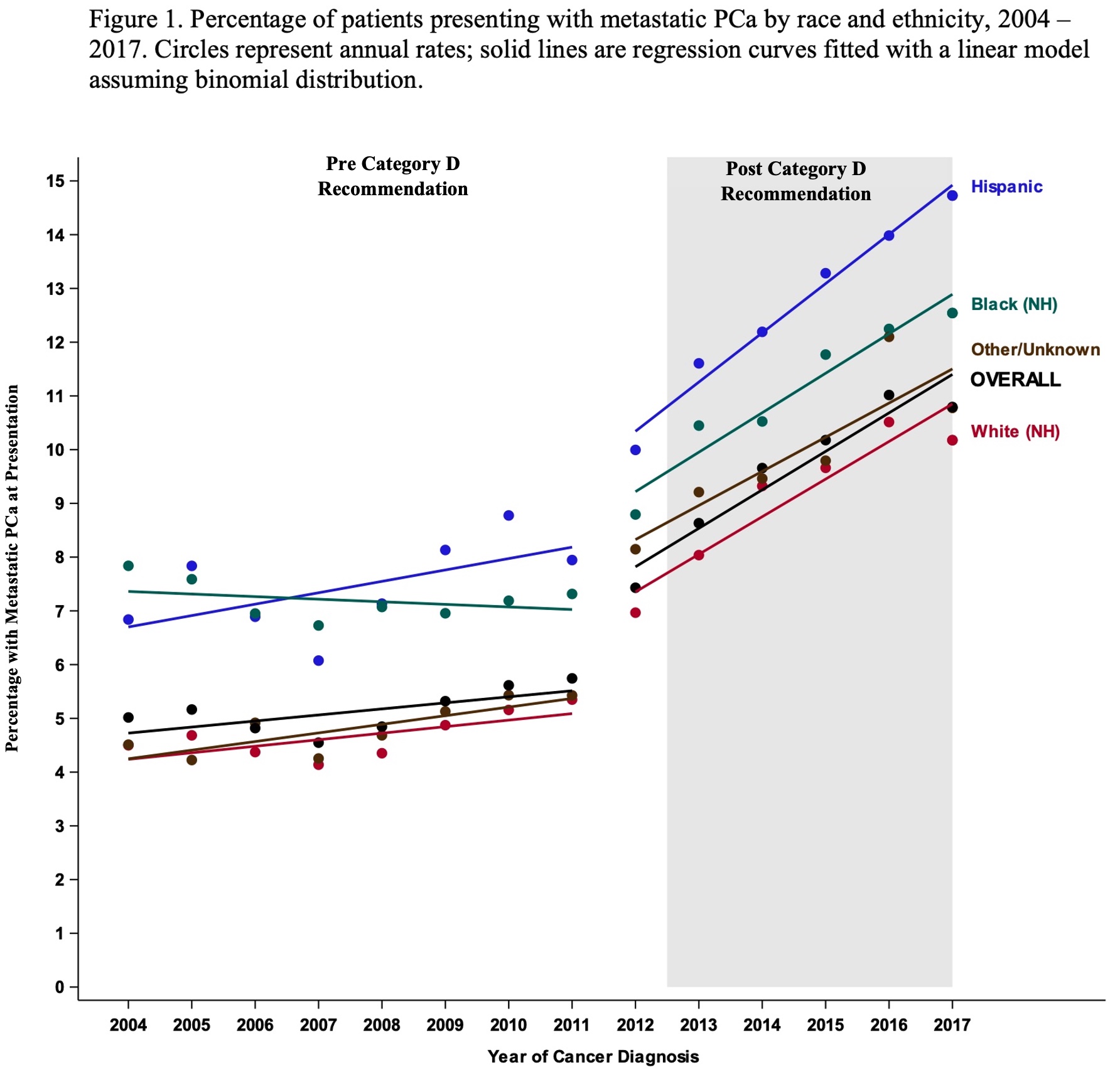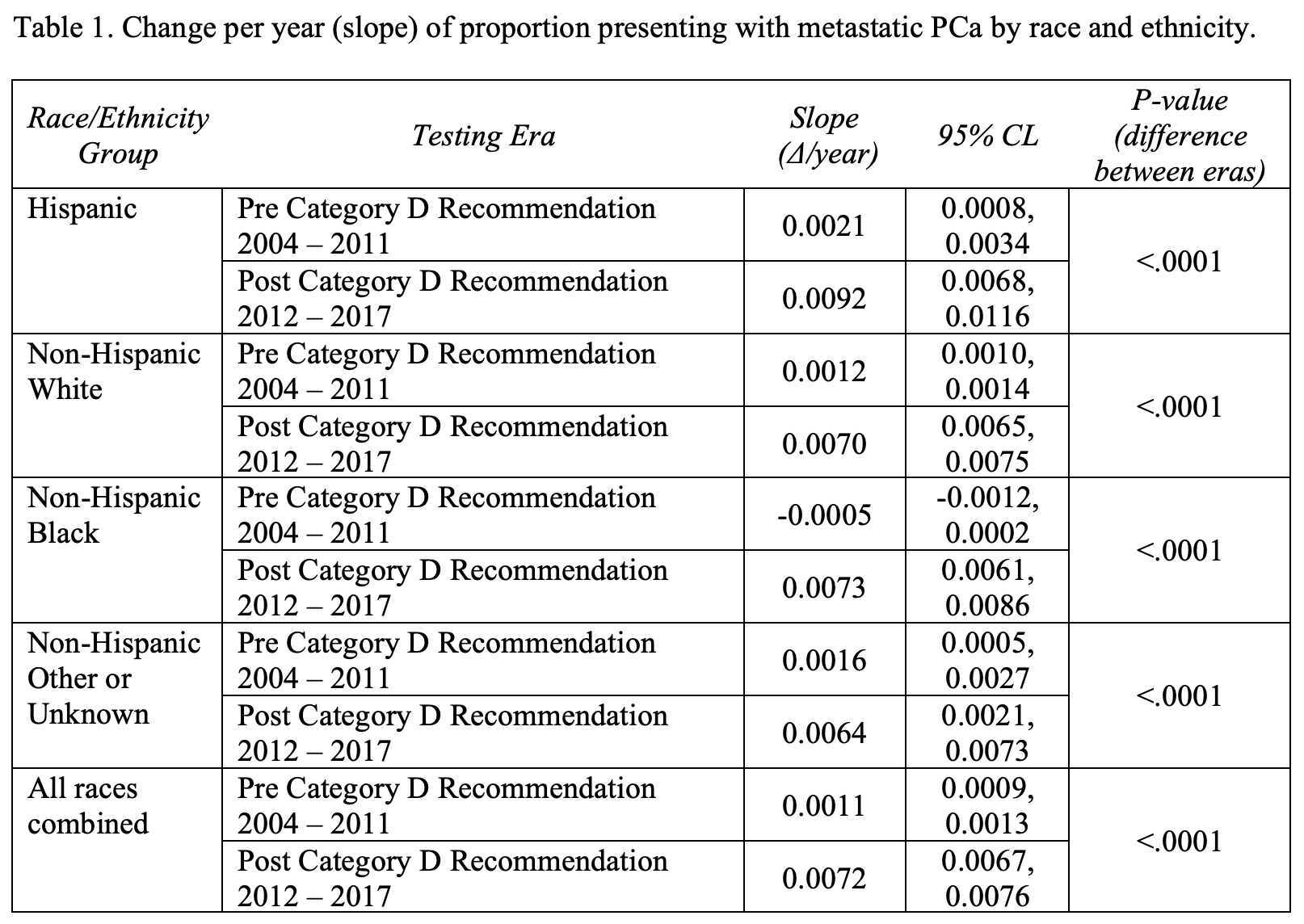Back
Poster, Podium & Video Sessions
Podium
PD17: Prostate Cancer: Detection & Screening III
PD17-08: Racial and Ethnic Disparities Magnified After U.S. Preventative Services Task Force Category D Recommendation for PSA Screening
Saturday, May 14, 2022
8:10 AM – 8:20 AM
Location: Room 252
Caleb Bercu*, Ram Pathak, Adam Cohen, Timothy Craven, Ashok Hemal, Winston-Salem, NC

Caleb Harold Bercu, BA
Wake Forest School of Medicine
Podium Presenter(s)
Introduction: Incidence of metastatic prostate cancer (PCa) has increased since 2008. Shifts in the United States Preventative Services Task Force (USPSTF) PSA screening recommendations may impact incidence of metastatic PCa at presentation in racial and ethnic groups differently. This study sought to determine the temporal relationship of potential racial and ethnic disparities in presentation of metastatic PCa prior to and after USPSTF category D recommendation regarding PSA screening.
Methods: Data were queried from the National Cancer Database from 2004 to 2017. The database is sourced from 1,500 facility hospitals and represents more than 70 percent of newly diagnosed cancer cases. This study used logistic regression models to examine interactions of metastatic PCa with age, race, ethnicity, geographic location, education level, income, and insurance status. In 2012, USPSTF published a category D recommendation against PSA screening. Linear regression models assuming underlying binomial distribution were fitted to annual rates of metastatic PCa at presentation with an interaction for years 2012-2017 to evaluate the post category D recommendation era.
Results: Figure 1 depicts annual rates of presentation with metastatic PCa. The difference in increasing slopes during the pre and post category D recommendation eras is statistically significant (p < 0.0001) for all groups including Hispanics, Non-Hispanic Blacks, and Whites (Table 1). Hispanic and Non-Hispanic Black populations presented with highest rates of metastatic PCa for both pre and post USPSTF category D recommendation eras.
Conclusions: Non-Hispanic Black and Hispanic individuals are more likely to present with metastatic PCa compared to the White population. Since the USPSTF grade D recommendation against PSA screening, the incidence of presentation of metastatic PCa has increased disproportionately in minority populations.
Source of Funding: None.


Methods: Data were queried from the National Cancer Database from 2004 to 2017. The database is sourced from 1,500 facility hospitals and represents more than 70 percent of newly diagnosed cancer cases. This study used logistic regression models to examine interactions of metastatic PCa with age, race, ethnicity, geographic location, education level, income, and insurance status. In 2012, USPSTF published a category D recommendation against PSA screening. Linear regression models assuming underlying binomial distribution were fitted to annual rates of metastatic PCa at presentation with an interaction for years 2012-2017 to evaluate the post category D recommendation era.
Results: Figure 1 depicts annual rates of presentation with metastatic PCa. The difference in increasing slopes during the pre and post category D recommendation eras is statistically significant (p < 0.0001) for all groups including Hispanics, Non-Hispanic Blacks, and Whites (Table 1). Hispanic and Non-Hispanic Black populations presented with highest rates of metastatic PCa for both pre and post USPSTF category D recommendation eras.
Conclusions: Non-Hispanic Black and Hispanic individuals are more likely to present with metastatic PCa compared to the White population. Since the USPSTF grade D recommendation against PSA screening, the incidence of presentation of metastatic PCa has increased disproportionately in minority populations.
Source of Funding: None.



.jpg)
.jpg)